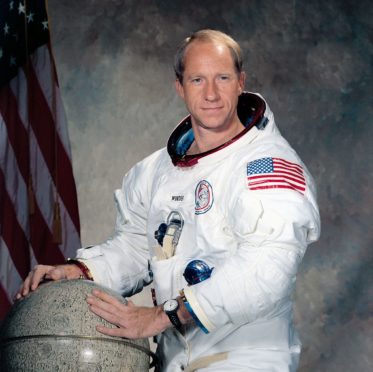He was once regarded as being “the most isolated human” in the history of mankind.
Alfred Worden, who has died aged 88, was one of the intrepid American astronauts who blazed the trail into outer space in the 1960s and 1970s.
As command module pilot for the Apollo 15 mission, he was one of only 24 people to have flown to the Moon – orbiting it 74 times in the Endeavour.
During the little craft’s return to Earth, Mr Worden performed an extravehicular activity to retrieve film cassettes from the exterior of the spacecraft.
It was the first “deep space” EVA in history, at great distance from any planetary body, and he carried out the manoeuvre with typical nervelessness.
The son of Merrill and Helen Worden, he was born on February 7, 1932, in Michigan.
Mr Worden received a Bachelor of Science degree in military science from the United States Military Academy at West Point, New York, in 1955, and Master of Science degrees in astronautical/aeronautical engineering and instrumentation engineering from the University of Michigan, in 1963.
Worden was one of the 19 astronauts selected by NASA in April 1966 and served as a member of the astronaut support crew for the Apollo 9 flight and as backup command module pilot for the Apollo 12 flight.
He finally earned his opportunity when he travelled on Apollo 15 with David Scott and Jim Irwin as part of the fourth crewed lunar landing mission and the first to visit and explore the Moon’s Hadley Rille and Montes Apenninus, which are located on the southeast edge of the Mare Imbrium (Sea of Rains).
At one point, Mr Worden was listed in the Guinness Book of World Records as the “Most isolated human being” during his time alone on Endeavour.
When the orbiting command module was at its greatest distance from Scott and Irwin in the Falcon, he was 2,235 miles away from any other human beings.
But he said he enjoyed his “three wonderful days in a spacecraft all by myself”, including not communicating with Earth while on the far side of the Moon, because he was used to being alone as a fighter pilot.
After retirement from NASA and active duty in 1975, he became president of Maris Worden Aerospace, and then vice president of Goodrich Aerospace in Ohio.
He was also chairman of the Astronaut Scholarship Foundation until 2011, an initiative which provided scholarships to exceptional science and engineering students, and which he said gave him as much satisfaction as any of his adventures in the sky.
